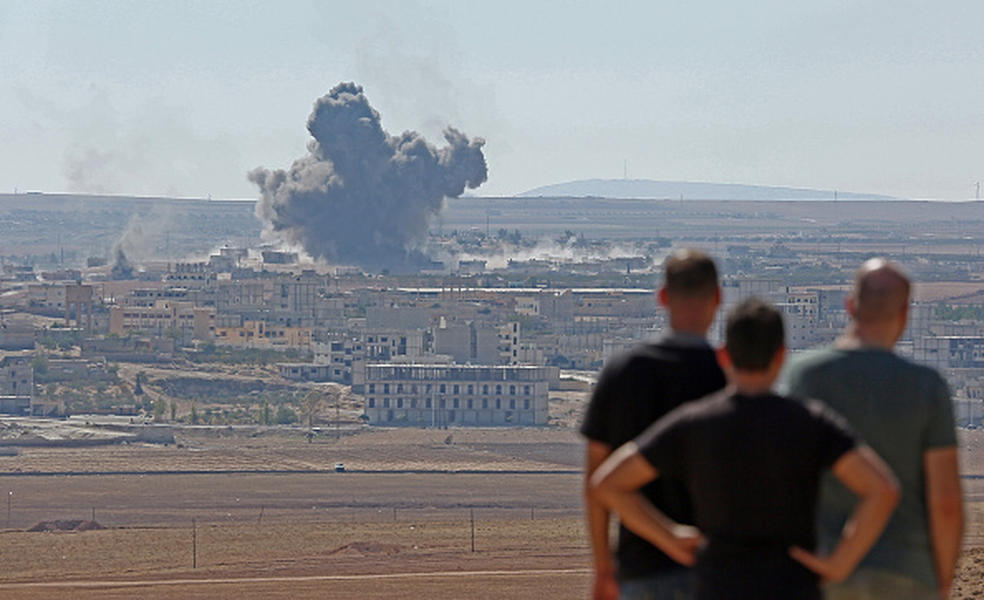Airstrikes hit ISIS targets as ISIS advances on Kurdish Syria-Turkey border town


A free daily email with the biggest news stories of the day – and the best features from TheWeek.com
You are now subscribed
Your newsletter sign-up was successful
Since mid-September, Islamic State of Iraq and Syria (ISIS) militants have been fighting their way toward the Syrian town of Kobani, right across the border from Turkey. On Monday, ISIS fighters broke through the Kurdish forces defending the town and raised black flags over two buildings in the eastern part of Kobani. Early Tuesday, reporters in Turkey heard warplanes overhead and saw plumes of smoke rise over ISIS areas; the U.S. has not confirmed its involvement in the airstrikes, though the airstrikes are widely believed to have come from U.S. aircraft. Here's the view of the strikes from the Turkish side of the border:
Iframe Code
By Tuesday morning, Kurdish forces had driven out the ISIS fighters from eastern Kobani, according to the UK-based Syrian Observatory for Human Rights, though ISIS has apparently captured some buildings in the south and a partially built hospital in the west of the city. "It is the first time that people have the impression that the airstrikes are effective," Kurdish military coordinator Barwar Mohammad Ali told The New York Times. ISIS is still better armed and numerically stronger, he added, so "they need more."
The Week
Escape your echo chamber. Get the facts behind the news, plus analysis from multiple perspectives.

Sign up for The Week's Free Newsletters
From our morning news briefing to a weekly Good News Newsletter, get the best of The Week delivered directly to your inbox.
From our morning news briefing to a weekly Good News Newsletter, get the best of The Week delivered directly to your inbox.
Turkish tanks are in position across the border, but have not intervened. Hundreds of civilians fled Kobani on Monday, joining the 160,000 Syrians who have crossed into Turkey as ISIS has advanced.
A free daily email with the biggest news stories of the day – and the best features from TheWeek.com
Peter has worked as a news and culture writer and editor at The Week since the site's launch in 2008. He covers politics, world affairs, religion and cultural currents. His journalism career began as a copy editor at a financial newswire and has included editorial positions at The New York Times Magazine, Facts on File, and Oregon State University.
-
 The environmental cost of GLP-1s
The environmental cost of GLP-1sThe explainer Producing the drugs is a dirty process
-
 Nuuk becomes ground zero for Greenland’s diplomatic straits
Nuuk becomes ground zero for Greenland’s diplomatic straitsIN THE SPOTLIGHT A flurry of new consular activity in Nuuk shows how important Greenland has become to Europeans’ anxiety about American imperialism
-
 ‘This is something that happens all too often’
‘This is something that happens all too often’Instant Opinion Opinion, comment and editorials of the day
-
 British warship repels 'largest Houthi attack to date' in the Red Sea
British warship repels 'largest Houthi attack to date' in the Red SeaSpeed read Western allies warn of military response to Iranian-backed Yemeni rebels if attacks on ships continue
-
 Houthi rebels claim Red Sea ship attacks
Houthi rebels claim Red Sea ship attacksspeed read Iran-backed Yemeni group vows to escalate aggression towards Israel-linked vessels in revenge for Gaza war
-
 Israel plans next phase of Gaza war as first hostages released
Israel plans next phase of Gaza war as first hostages releasedSpeed read After four-day ceasefire 'we will not stop' until destruction of Hamas, says Israel
-
 Mob storms Russian airport 'looking for Jews'
Mob storms Russian airport 'looking for Jews'Speed Read Plane from Israel surrounded by rioters chanting antisemitic slogans after landing in Russia's Dagestan region
-
 Tuberville's military promotions block is upending lives, combat readiness, 3 military branch chiefs say
Tuberville's military promotions block is upending lives, combat readiness, 3 military branch chiefs saySpeed Read
-
 Ukraine's counteroffensive is making incremental gains. Does it matter in the broader war?
Ukraine's counteroffensive is making incremental gains. Does it matter in the broader war?Speed Read
-
 US commissions first-ever Navy ship in a foreign port
US commissions first-ever Navy ship in a foreign portSpeed Read
-
 British spy chief, Wagner video suggest Prigozhin is alive and freely 'floating around'
British spy chief, Wagner video suggest Prigozhin is alive and freely 'floating around'Speed Read
